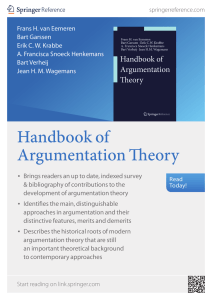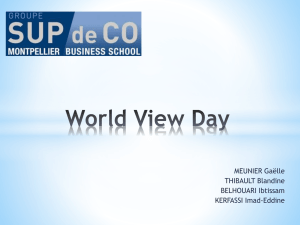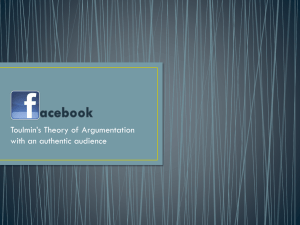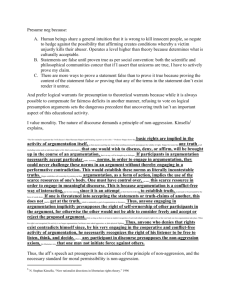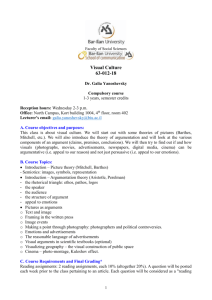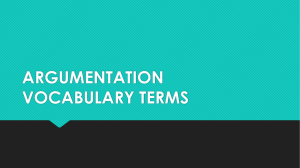Anna_Semenova_Antirecessionary Policy Reasoning in France
advertisement
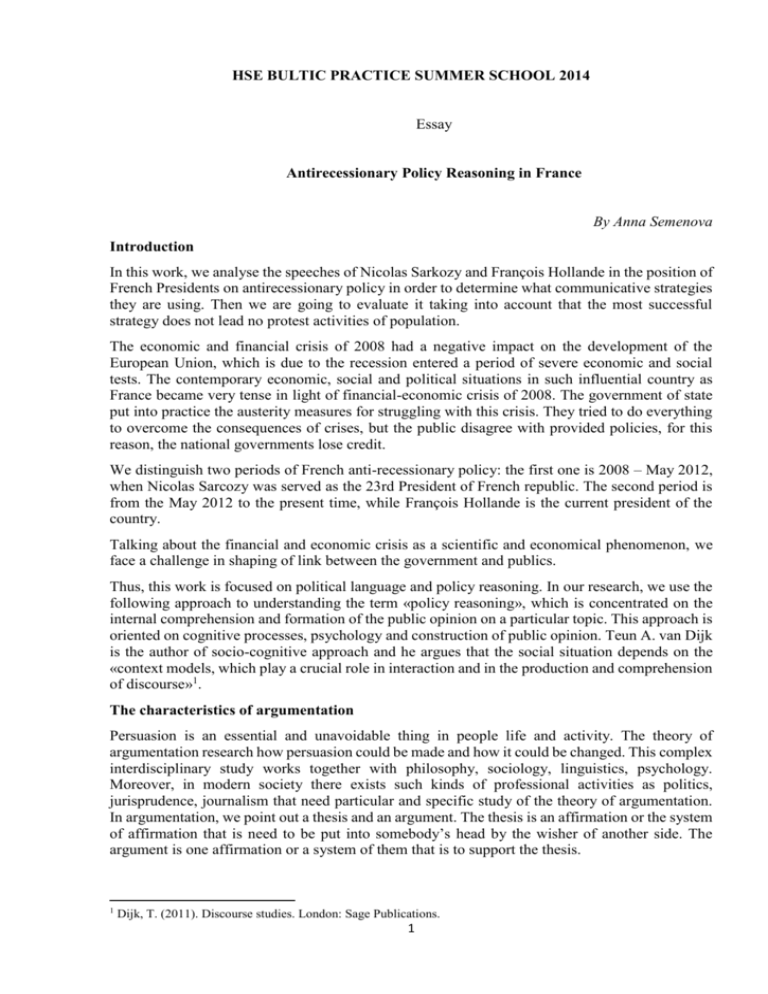
HSE BULTIC PRACTICE SUMMER SCHOOL 2014 Essay Antirecessionary Policy Reasoning in France By Anna Semenova Introduction In this work, we analyse the speeches of Nicolas Sarkozy and François Hollande in the position of French Presidents on antirecessionary policy in order to determine what communicative strategies they are using. Then we are going to evaluate it taking into account that the most successful strategy does not lead no protest activities of population. The economic and financial crisis of 2008 had a negative impact on the development of the European Union, which is due to the recession entered a period of severe economic and social tests. The contemporary economic, social and political situations in such influential country as France became very tense in light of financial-economic crisis of 2008. The government of state put into practice the austerity measures for struggling with this crisis. They tried to do everything to overcome the consequences of crises, but the public disagree with provided policies, for this reason, the national governments lose credit. We distinguish two periods of French anti-recessionary policy: the first one is 2008 – May 2012, when Nicolas Sarcozy was served as the 23rd President of French republic. The second period is from the May 2012 to the present time, while François Hollande is the current president of the country. Talking about the financial and economic crisis as a scientific and economical phenomenon, we face a challenge in shaping of link between the government and publics. Thus, this work is focused on political language and policy reasoning. In our research, we use the following approach to understanding the term «policy reasoning», which is concentrated on the internal comprehension and formation of the public opinion on a particular topic. This approach is oriented on cognitive processes, psychology and construction of public opinion. Teun A. van Dijk is the author of socio-cognitive approach and he argues that the social situation depends on the «context models, which play a crucial role in interaction and in the production and comprehension of discourse»1. The characteristics of argumentation Persuasion is an essential and unavoidable thing in people life and activity. The theory of argumentation research how persuasion could be made and how it could be changed. This complex interdisciplinary study works together with philosophy, sociology, linguistics, psychology. Moreover, in modern society there exists such kinds of professional activities as politics, jurisprudence, journalism that need particular and specific study of the theory of argumentation. In argumentation, we point out a thesis and an argument. The thesis is an affirmation or the system of affirmation that is need to be put into somebody’s head by the wisher of another side. The argument is one affirmation or a system of them that is to support the thesis. 1 Dijk, T. (2011). Discourse studies. London: Sage Publications. 1 We are going to study the most widespread ways of argumentation according to Ivin. First, they are divided into universal and contextual. The latter is oriented at the specific auditorium and it includes references to the tradition, taste, believes. The universal way of argumentation could be used in any auditorium, and it consists of empirical and theoretical arguments2. Empirical ways of argumentation are based at the experience, theoretical – at the reasoning. However, the difference between these two kinds of argumentation is very vague as the border between the empirical and theoretical knowledge. Sensual experience of person, his feelings and perceptions, is a source of his connections with world. Reasoning with reference to the experience makes an affirmation plausible. However, the empirical facts could be relevant, sometimes, the facts, that initially seemed to be the truth, need to be checked by the theoretical knowledge. After it, the position about such kinds of facts could be change, they could became even unsuitable. Empirical argumentation Such empirical data as examples, illustrations or models could be used during the reasoning. The example is a fact or a specific case that is used for the following reasoning and for the proof of already made conclusions. Model is an evaluation that refers to a particular case and it represents a specific standard, an ideal. Illustration is a fact or specific case is to strengthen the conviction or auditorium in already known fact. If the example push the trough to the new conclusions and supports these conclusions, than the illustration makes clear already known fact and demonstrate its significance. Theoretical argumentation However, it is not possible to use always only empirical argumentation. It is also needed to use the theoretical argumentation that is based at the reasoning and already known facts. In order to use this kind of argumentation, the auditorium should be already acquainted with some particular knowledge that will also to construct reasoning. Thus, theoretical argumentation hardly applied to the citizen of a particular country through performance. Contextual argumentation This kind of argumentation is always focused on the specific auditorium that has the same beliefs, recognize the same authorities and support the same traditions. Contextual ways of argumentation includes the arguments that appeal to the tradition, the authority, the intuition, the belief, the common sense, taste. People are always immerse in some specific situation, they live in particular country in particular time and share common believes and superstitions of their society. Argument to the tradition The most common and the most significant type of contextual argumentation is the argument to the tradition. Tradition represents anonymous, independently appeared system of norms, rules and models that are used by enough widespread and sustainable group of people. That is why, the impact of tradition at the argumentation is quite high. It supports the most common rules and believes for the wide range of people in particular time period. Argument to the authority АРГУМЕНТАЦИЯ И ЛОГИКА.2015. АРГУМЕНТАЦИЯ И ЛОГИКА [ONLINE] Available at: http://psylib.org.ua/books/ivina01/txt13.htm. [Accessed 28 April 2015]. 2 2 An argument to the authority is quite close to the argument to tradition. The argument to the authority is a reference to the opinion or activity of a particular person that has a good recommendation in an appropriate field. Intuition argumentation Intuition argumentation is a reference to the intuitive apparency of brought forward fact. The role of intuition recommendation is very big I as well in mathematics and logics as in moral life in historical and humanitarian knowledge. However, the intuition argumentation is rarely used separately. Intuition is quite close to the believes that could be defined as deep, sincere, emotional confirmation about the justice of some fact or conception. Intuition is a discretion of truth or good and the belief is learning towards those that seems to be truth or good. Belief makes us to accept any statement as a plausible without criticism and discussion. Common sense argumentation Common sense could be characterized as sense of truth and justice common for almost all people that was acquainted by their personal experience. Common sense is not a knowledge, this is a way of knowledge selection. Common sense argumentation is also wide used in contextual argumentation. Some feelings, statements and conclusions that contradict the common sense, could not be right. Common sense usually concern public and practical activities. It helps to judge not with help of the rational facts, but of the examples. Analysis In order to make an analysis of argument strategies we made a selection of speeches. As to Nicolas Sarkozy performances, we have chosen following speeches: The Speech called «Measures to support the economy», was performed by the President of the French Republic, Nicolas Sarkozy in Argonay on 23 October 20083. Nicolas Sarcozy was in Argonay, Haute-Savoie, a small town on the outskirts of Annecy. In the beginning of his journey, he visited a construction company, with a large part of his cabinet including the Economy Minister, Christine Lagarde, the spokesperson of the government, Luc Chatel, and the President of the National Assembly, Bernard Accoyer, also mayor of Annecy-leVieux. Then, it was his first long speech about the economic crisis in front of about seven hundred people4. This speech was targeted at different publics, especially at business groups, but also at lay public, that had access to these discourse through the media. Television broadcasts Face à la crise from the 5th of February of 20095,6 and from the 27th October of 20117. Measures to support the economy – Speech by M. Nicolas Sarkozy, President of (...) - La France au Canada/France in Canada. 2015. Measures to support the economy – Speech by M. Nicolas Sarkozy, President of (...) - La France au Canada/France in Canada. [ONLINE] Available at: http://www.ambafrance-ca.org/Measures-to-support-theeconomy. [Accessed 28 April 2015]. 4 Le plan français de soutien aux entreprises. 2015. Le plan français de soutien aux entreprises. [ONLINE] Available at: http://www.lefigaro.fr/economie/2008/10/24/04001-20081024ARTFIG00282-face-a-la-crise-l-etat-fait-feu-detout-bois-.php. [Accessed 28 April 2015]. 5 Les principaux extraits de l'émission "Face à la crise". 2015. Les principaux extraits de l'émission "Face à la crise". [ONLINE] Available at: http://www.lemonde.fr/politique/video/2009/02/06/les-principaux-extraits-de-l-emissionface-a-la-crise_1151634_823448.html. [Accessed 28 April 2015]. 6 Recherche - MYTF1. 2015. Recherche - MYTF1. [ONLINE] Available at: http://www.tf1.fr/recherche/?query=Face+à+la+crise+Nicolas+Sarkozy&facet=VIDEO&page=2. [Accessed 28 April 2015]. 7 Nicolas sarkozy Face à la crise et l'euro 1/6 - YouTube. 2015. Nicolas sarkozy Face à la crise et l'euro 1/6 YouTube. [ONLINE] Available at: https://www.youtube.com/watch?v=ENaWHg3m81M. [Accessed 28 April 2015]. 3 3 «Faced with the crisis» or «Face à la crise» in French language, is an exceptional French television program, which broadcasts the interviewing of the Head of State, Nicolas Sarkozy, from the hall of the Elysee Palace in Paris live. The first show, entitled «Facing the crisis» comes a week after a day of strike and mass demonstration that attracted 2.5 million people. Nicolas Sarkozy was interviewed by such French journalists as David Pujadas, Laurence Ferrari, Alain Duhamel et Guy Lagache. This show was translated at three French channals:TF1, France 2 et M6 and at the radio. The audience was about 15,1 millions of televiewers8. The second addition of program was in 2 years in October of 2011. This time there were only two interviewrs – journalists: Jean-Pierre Pernaut et Yves Calvi. The program was broadcasted online at two TV channels: TF1 and France 2. The audience was around 11,9 millions of viewers. New Year Speeches from the 31st of December of 2010 and 2011 that were translated at the national television. As to the thesis that we have chosen they are the necessity of reforms and structural rearrangements in France and measures for support of business and innovations. The necessity of measures for support of business and innovations From «Measures to support the economy» on 23 October 2008 «The investment is going to play the most crucial role. Investment supports simultaneously today’s activity and the improvement of tomorrow’s productivity and competitiveness. Investment will be the budget priority for the next three years: in higher education, research, defence, as well as thousands of kilometres of canals and railways, public transport and the new energies promoted by the Grenelle Environnement forum». In this argument, Nicolas Sarkozy makes promises and gives the empirical illustrations of how investments will be used in future and how they will help to improve life of ordinary people. This statements are targeted at the persuasion of people in real necessity of investments contributions. «In three years, we are going to put €175 billion of direct state investment into economic activity. This will be on top of investments by private individuals and businesses which the State is going to support with zero-rate loans which all French households will be able to use to improve the insulation of their homes and cut their energy consumption». As we can see, Sarkozy uses the numbers, they are usually works effectively and impressively at usual people in argumentation. However, taking into account the audience of this speech, we can conclude that Sarkozy is trying to be not only persuasive and appealing, but also reasonable. This speech includes some specific economic terminology such as private individuals, zero-rate loan that is targeted at the specific business groups, so we are talking also about the contextual argumentation. «For all entrepreneurs in France, the message is clear: from today until 1 January 2010, any new investment you decide to make won’t be taxed». Thus, the president give us the sub thesis, from where we conclude that this speech is constructed logically and not oriented to be only emotional, but also quite rational. Face à la crise from the 5th of February of 2009 8 VIDEOS - Nicolas Sarkozy: un quinquennat d'interviews télévisées | Slate.fr. 2015. VIDEOS - Nicolas Sarkozy: un quinquennat d'interviews télévisées | Slate.fr. [ONLINE] Available at: http://www.slate.fr/story/49247/sarkozyinterview-video-television-quinquennat. [Accessed 28 April 2015]. 4 About the recovery by means of investments «Question that was posed is a crucial issue. It is needed to mobilize all possible means to guarantee, to secure and to conserve the growth of workspaces that is necessary for us. So, Fracois Fillion and me, we have mobilized everything that we had, as investments were expected during several years and were promised». In this statement, Nicolas Sarkozy makes a reference to his and Fracois Fillion authority. He wants people to believe that the decision that they took tougher with the minister is right, especially when they put so many forces to its realisations. How could the decision be wrong if so serious people choose to implement it? This is the idea that should be put in the minds of French viewers by emotional argumentation. Face à la crise from the 27th October of 2011 «…all of us need to be responsible. However, you should not hope at the system of social support, waiting for allowancing for living. It is necessary invest in information, innovation, research. In order to save our social model from crisis, out main strategies are work, innovations and investment… France could be successful if we invest in agriculture, aeronautics, automobile industry, in pharmaceutical industry. We are at the way of reduction of our deficit and our expenses. However, It is not sufficient. I want France can calculate. So for this, we choose the invests in future. Thus, we have an autonomy in universities. That is why we invest in truth. Less support, more investment». Again, in this statement the president of France gives examples of possible ways for investments. This should help not only to support business activities but also to save the social system. This is the common sense argumentation, because it is quite obvious that people need to be active, not passive in order to overcome crises phenomena, reduce the budget deficit and state expanses. People need to work and entrepreneurs need to invest. New Year Speech, 2010 « Growth is returning. The major reforms under way are starting to bear fruit. Our universities – autonomous at last – are opening themselves up and modernizing like never before. Our researchers have been given huge financial resources thanks to the “big loan”. Our companies are making full use of the crédit d’impôt recherche [R&D tax credit9] to innovate». This argument has again the empirical substance in order to show people that investment activities and the support of business already works and that France need to continue to pursue the same point. New Year Speech, 2011 « The problem at issue isn’t a new round of spending cuts for the coming year. What had to be done has been done by the government. Our work must now give priority to growth, competitiveness and reindustrialization: they alone will enable us to create jobs and purchasing power». In this argument Sarkozy tries to reassure people that austerity measures is not big issue that people need to support competitiveness and reindustrialization. Here, we can not see deep reasoning or even empirical examples or illustrations. This is just emotional argument that appeal to the common sense of people. The necessity of social reforms and structural rearrangements 9 Tax incentive created to encourage companies to invest in Research and Development. 5 New Year Speech, 2010 «However, thanks to the work of the French, their courage, their ability to adapt, the strength of our economy and the advantages of our social model, the recession was less severe and shorter than what many of our partners experienced». This argument has purely emotional tone, Sarkozy thanks French citizens and says that the recession in other countries in worse that in France. I think this is a very strong emotional argument of common sense of even intuition, because people want to be better than the others are. «Our pension system was shielded from the threat of bankruptcy, which was inevitable had we done nothing. It’s our elders’ pensions which were saved and, for the first time, France was able to carry through a major reform without violence and without it being blocked, thanks to the minimum service mechanism, which worked well, and to the spirit of responsibility of the French people, who were well aware that this step, however painful, was unavoidable. I want to pay tribute to their maturity and collective understanding». Talking about the pension reform Sarkozy again uses emotional argumentation, moreover he show how he is grateful to the understandings of people. This should help to calm down people to assure them that everything that had been done is very reasonable despite the inconveniences that publics experienced. New Year Speech, 2011 «We must, we can remain confident about the future. Because even though so many countries have experienced insurmountable difficulties, France has held out. She has resisted. … thanks to our social welfare system which guarantees solidarity in adversity, thanks to the reforms we have carried out over the past few years. I am thinking in particular of the pensions reform and all the measures aimed at cutting our public spending, which have allowed France to retain the confidence of those who lend her their savings to finance her economy.». The same idea is expressed about the exceptional role of France and its strong position and right course of reforms during crisis. Face à la crise from the 27th October of 2011 «As we have that is called tripple A, it means that we are a good managed country. There are 5 countries out of 27, that have triple A, including France. What is tripple? It allows reimbursing our debt with the interest rate 3%. What is the interest rate in Italy? It is 6%. In Spain it is 5.5% In Germany 2.3%.» «Salaries and retire pensions are reduced in Spain, Italy, Portugal, Ireland. Portugal is a serious country, they are work there. In France, we are protected. Why? Because we have adopted a pension reform in time. We decided an issue with recruitment of bureaucrats and eliminated 150 workplaces. The problem is about our expenses and we need to work more despite the pension reform…It is needed for French to understand it» Here, N. Sarkozy shows us the line of reasoning, he tries slowly prove that France is not in bad economic situation comparatively with some other European countries. For this purpose, he widely uses illustrations and appeals to the common sense argumentation. Moreover, he names some numbers that means interest rate. They are quite simple, nevertheless they could not be understood correctly by people, how do not understand in economics. Again, we can find the idea that France is protected because of already adopted reforms and firing out bureaucrats. «I tell the French what happed when countries loose the moment of necessary reforms». 6 Nicolas Sarcozy makes a references to the Greek experience, this statement is absolutely based on emotions and feelings. This statement is considered as intuition argumentation, all French could intuitively understand what that something bad happens with countries that are losing time, it makes them understand that the reforms are needed as soon as possible even if this new rearrangement brings something uncomfortable. The next part is devoted to the discourse of François Hollande and we took the following speeches: Press conference of François Hollande from 13 November 2012. This is the first press conference at the Elysee Palace, six months after the inauguration of François Hollande in the position of the President of French Republic. About 400 journalists were invited for this event and the press conference were broadcasted live on France 210. François Hollande’s TV interview on French National Day from 14.07.201311. President François Hollande gave a live television interview at the Elysee Palace that was translated on TV channels TF1 and France 2. The statements of the head of state were just after the traditional military parade, and it was requested by several political leaders of the majority and the opposition. The questions were asked by the French journalist Claire Chazal (TF1) and Laurent Delahousse (France 2), the interview took place in the garden of the Presidential Palace. New Year Speeches from the 31st of December of 201212 and 201313 that were broadcasted at the national TV channels. Press conference of François Hollande from 18 September 2014 The President answered questions from 350 journalists at the fourth press conference during his presidency at the Elysee Palace14. Then, we have the analysis according the same theses. The necessity of measures for support of business and innovations Press conference of François Hollande from 13 November 2012 «A report was commissioned from a great industrialist, Louis Gallois. …It’s about giving visibility to company bosses, security to employees, stability to investors, and confidence to consumers and savers. The aim of the pact is to produce more and better in France, which means better financing 10 EN DIRECT. La première conférence de presse de François Hollande- 13 novembre 2012 - L'Obs. 2015. EN DIRECT. La première conférence de presse de François Hollande- 13 novembre 2012 - L'Obs. [ONLINE] Available at: http://tempsreel.nouvelobs.com/politique/20121113.OBS9177/en-direct-la-premiere-conference-de-presse-defrancois-hollande.html. [Accessed 28 April 2015]. 11 François Hollande’s TV interview on French National Day - France in the United Kingdom - La France au Royaume-Uni. 2015. François Hollande’s TV interview on French National Day - France in the United Kingdom La France au Royaume-Uni. [ONLINE] Available at: http://www.ambafrance-uk.org/Francois-Hollande-s-TVinterview. [Accessed 28 April 2015]. 12 President Hollande’s New Year’s Eve broadcast to French - France in the United Kingdom - La France au Royaume-Uni. 2015. President Hollande’s New Year’s Eve broadcast to French - France in the United Kingdom La France au Royaume-Uni. [ONLINE] Available at: http://www.ambafrance-uk.org/President-Hollande-s-NewYear-s. [Accessed 28 April 2015]. 13 François Hollande’s New Year greetings to the French people - France in the United Kingdom - La France au Royaume-Uni. 2015. François Hollande’s New Year greetings to the French people - France in the United Kingdom - La France au Royaume-Uni. [ONLINE] Available at: http://www.ambafrance-uk.org/Francois-Hollande-s-NewYear,23174. [Accessed 28 April 2015]. 14 Ce qu'il faut retenir de la conférence de presse de François Hollande. 2015. Ce qu'il faut retenir de la conférence de presse de François Hollande. [ONLINE] Available at: http://www.francetvinfo.fr/politique/francoishollande/conference-de-presse-de-hollande/ce-qu-il-faut-retenir-de-la-conference-de-presse-de-francoishollande_697553.html. [Accessed 28 April 2015]. 7 of exports, investment and innovation. That’ll be the role of the public investment bank. It’ll be given firepower of €40 billion, and access to it will be easy. The decisions will be swift and, in 90% of cases, taken at regional level. The pact is focused on SMEs. It’ll help them develop, grow, recruit and specialize. For five years it’ll guarantee them the fiscal and regulatory stability they need. The pact is a way of preparing for the future through the choice of major sectors: health, generic technologies and the energy transition». This argument of François Hollande is very logical, it does not include empty information, but quite opposite. It is full of empirical information and examples. Firstly, he uses the Argument to the authority. He names Louis Gallois as an expert, who commissioned the report about the support of businesses. Louis Gallois is appointed as the government's Commissioner for Investment and he is also a famous French businessman, what makes him a practician in the field of business. Hollande explained the purpose of this pact, what is more important his mentioned public investment bank as a mechanism of implementation of support measures. In addition, the president uses many numbers, what sounds very persuasive for general public and likely reasonable for targeted business groups. New Year Speeches from the year 2012 «This is why Jean-Marc Ayrault’s government and I have taken three major decisions since my election… The second decision concerns the competitiveness pact. In 2013, I want to restore companies’ room for manoeuvre with a €20 billion tax credit to allow them to recruit, invest and export». In this speech, Hollande again refers again to the authority, this time it is a Prime Minister of France Jean-Marc Ayrault. Together with him, Hollande took important decisions about the destiny of French economy. It is important to notice, that the speech is structured. Already from this argument, the present said that they have taken three decisions. Then he listed all of them, for us the most significant is the second about the competitiveness pact, where he makes a promise and gives number of money in order to assure people, that everting is counted already. «There we are, the course is set: everything to encourage employment, competitiveness and growth. We will hold this course, despite all obstacles. I shall not deviate from it. Not because of stubbornness, but conviction. It is in France’s interest. To prepare for the future, our country needs to invest in all areas: in our manufacturing and agricultural sectors, housing, the environment, health, research and new technology. I have therefore asked the government to propose a public and private investment strategy for modernizing France by 2020». The argument is the most emotional among the others. The president tries to encourage people and make sure that everything is under control. He tries to prove these words with the promises about the real strategy. François Hollande’s TV interview on French National Day from 14.07.2013 « I’m going to promote investment – the investment the Prime Minister announced which will focus on tomorrow’s France. …The French have to tell themselves: we’re in a great country, we mustn’t run ourselves down, succumb to pessimism, a sort of feeling of resignation. … We’ve also got the new technologies to promote: France is a country of inventors, researchers. So we’re going to put every effort into the digital economy, high-speed broadband network, so that in 10 years’ time, or even earlier, we’re the country where it’s easiest for all those who want to communicate to do so, and particularly businesses. Third example: infrastructures, modes of transport, everything in which France must be able to excel – here too she’s regarded as a country of excellence. And then the last example I want to give: our universities, our research – it’s here we have to make the effort. So everything I can find in the way of additional resources, everything the state can invest, with the private sector, we’ll do in these spheres». 8 In this argument, the president use the emotions, patriotic spirt in order to persuade that France is a great country, and then he gives examples of possible fields for investment. Again as before, his argument is structured and enumerated. In addition, it is possible to say that this is the argument to tradition, because historically France was a great power and strong country. Even now, facing the economic troubles, citizens must stay calm and patient in order not only overcome crisis but to save the image of country. Press conference of François Hollande from 18 September 2014 «The choice of competitiveness, because you can build nothing – nothing – without there being solid businesses, industrial and agricultural excellence and successful services. To support business is to support the people working in them. It’s an irrevocable choice. That’s the point of the Responsibility [and Solidarity] Pact. …This choice isn’t easy. It isn’t easy in the eyes of the French, at a time when so many needs have not been met. These choices aren’t easy, because, necessarily, what’s devoted financially to businesses isn’t allocated to households». Thus, Hollande explains how it is difficult to take decision about the financial support of business by confining other people in their needs and expenses. These arguments are emotionally appealing, he apologized before people and wants they understand that such kinds of measures are necessary for economy. The necessity of social reforms and structural rearrangements Press conference of François Hollande from 13 November 2012 «France needs everyone. All her skills, all her entrepreneurs, all her assets, all her generations, all her strengths. United in recovery. …Thanks to this effort, balance in the public finances will be achieved in future mainly through savings. Public expenditure today amounts to 57% of our gross domestic product. That’s a lot. It’s a record. Just five years ago, it amounted to only 52%. We must be capable of doing better by spending less. By modernizing the state, decentralizing, simplifying procedures, improving the service rendered to citizens. …€50 billion in savings over five years. It’s the first step towards recovery». As usually, Holland’s speech is full of emotional argumentation, examples and different numbers. He is grateful to the population, that they are able to stand crisis difficulties and austerity measures. Moreover, he explains that there already have been done some activities in order to reduce state debt and they work what makes his argument reasonable and logical. «This is the idea of future jobs for young people who have left school with no qualifications. There are 500,000 of them today. 100,000 jobs will be created in 2013, then 150,000 every year thereafter. This is the purpose of the “generation contracts” , which have been approved by all the employees’ and employers’ organizations. It’s an exceptional agreement because the mechanism itself is exceptional. It involves companies hiring a young person while keeping on a senior employee. These contracts will apply to 150,000 people next year». This is the sub thesis about the necessity to reduce an unemployment rate as a part of social reforms. Thus, the French President uses empirical argumentation with particular examples and many numbers in order to explain the need of «generation contracts» as one of the measures to combat unemployment. Nevertheless, he uses the strong word «exceptional», what give an evaluation for this measure and makes the public appreciate it even more. New Year Speeches from the year 2012 «We will strive to achieve a single goal: reverse the unemployment curve within a year. We will have to achieve this, no matter what. With 150,000 future jobs for those young people furthest from the labour market. With the inter-generational contracts which will allow us to link the 9 experience of senior workers with the expectation of young people. These will come into force tomorrow. With vocational training, which will be reformed to give priority to supporting unemployed people into work». The same sub thesis is used here as in previous statement, Hollande is talking about the inspiration to decline the unemployment. This argument is emotional as many and again empirical. François Hollande’s TV interview on French National Day from 14.07.2013 «There’s a will, a strategy and coherence. We’ve put in place the jobs for the future scheme and there will be 100,000 – and I mean 100,000 – such jobs by the end of the year. There will be 70,000 intergenerational contracts by early next year. What I’m trying to do now, with the Minister of Labour and employers and trade unions, is to match job vacancies for which employees or more specifically job seekers haven’t been found with the waiting unemployed. So we’ve said that between now and the end of the year, for 35,000 of these available posts, we’re going to train unemployed people so that they can fill them». The same idea about the intergenerational of generational contracts is mentioned here. Hollande highlighted the need and rightness the approach to the problem by adopting these contracts. As usual, he gives to French citizens numbers that show the creation of work places. He appeals to the common sense argumentation, because many young people need these new work places and other citizens understand that such kind of measure with big numbers of new jobs is significant achievement. New Year Speeches from the year 2013 «In 2013, unemployment remained at a high level, even though things have been improving in recent months. … I repeat to you this evening: I have only one priority, only one goal, only one commitment: namely, employment! Because each job created means a little strength regained. Each unemployed person who starts working again means a family that can breathe, hope returning, spending power regained, social justice rediscovered. In 2014, we’ll need everyone to play an active role to win this battle». The issue of high unemployment rate is very topical during the presidency of François Hollande, thus it was mentioned many times in his speeches. This is an emotional argument with the reference to the common sense argumentation talking of elimination of unemployment as a gulp of air for families. Thus, Hollande even uses the metaphor in this speech, which are not used often. Press conference of François Hollande from 18 September 2014 «I’ve also made the choice of social justice. Access to healthcare has not only been protected but even supported. Treatment is reimbursed better. Costs linked to ageing – legislation is currently being discussed – are better taken into account. Low-income families, particularly single-parent families, have been supported more. Employees who have worked a long time have been able to leave at 60, because that was the condition for social cohesion. Need I go on»? Except unemployment, there are some others issue in the social sphere. Thus, the president showed the enhancement of social system against the background of financial and economic crises giving the description of rearrangements in different social dimensions. This argument is empirical, however without the quantitative information. Conclusions After the analysis of speeches we pointed out the similarities and differences of thу argumentation of Nicolas Sarkozy and François Hollande. All of them are summarized in the following Table 1. As a main dialogue strategy both presidents tries to calm down people by appealing to their 10 emotions and giving them empirical information. However, evaluating this strategy we can say it is unsuccessful, because as it is shown the Table 2, the demonstrations and protests keep going during all time of presidency. Table 1 The main peculiarities in Nicolas Sarkozy antirecessionary discourse. Sarkozy uses a lot of comparison with the other countries to show that France has better economic conditions. Common features of the presidents’ antirecessionary argumentation. Empirical argumentation Use the cases of successful reforms and measures and explain possibilities for further improvements. The main peculiarities in François Hollande antirecessionary discourse. Uses a lot of examples and illustrations, quantitative date. His speeches and arguments looks more structured, they are even enumerated. A lot of emotional Emotional argumentation argumentation shows the Try to encourage French gratitude and ask to be patient. people, reassure them in the right direction for the solving of crisis difficulties. Speaks about the France as a great power and calls for unity of people in order to overcome crises. Table 2 The examples of public actions during Nicolas Sarkozy presidency January 2009, Mass demonstrations and strikes; The examples public actions during François Hollande presidency September 2012, A movement against the politics of austerity; March 2009, Mass protest; 2013, protests against Hollande’s pension reforms; May 2009, Traditional May Day march; September, October 2010, a series of pension reform strikes and demonstrations. April 2014, protest against government economic reform plans and austerity measures. Bibliography 1. Ce qu'il faut retenir de la conférence de presse de François Hollande. 2015. Ce qu'il faut retenir de la conférence de presse de François Hollande. [ONLINE] Available at: http://www.francetvinfo.fr/politique/francois-hollande/conference-de-presse-dehollande/ce-qu-il-faut-retenir-de-la-conference-de-presse-de-francoishollande_697553.html. [Accessed 28 April 2015]. 2. Dijk, T. (2011). Discourse studies. London: Sage Publications. 11 3. EN DIRECT. La première conférence de presse de François Hollande- 13 novembre 2012 - L'Obs. 2015. EN DIRECT. La première conférence de presse de François Hollande- 13 novembre 2012 - L'Obs. [ONLINE] Available at: http://tempsreel.nouvelobs.com/politique/20121113.OBS9177/en-direct-la-premiereconference-de-presse-de-francois-hollande.html. [Accessed 28 April 2015]. 4. François Hollande’s New Year greetings to the French people - France in the United Kingdom - La France au Royaume-Uni. 2015. François Hollande’s New Year greetings to the French people - France in the United Kingdom - La France au Royaume-Uni. [ONLINE] Available at: http://www.ambafrance-uk.org/Francois-Hollande-s-NewYear,23174. [Accessed 28 April 2015]. 5. François Hollande’s TV interview on French National Day - France in the United Kingdom - La France au Royaume-Uni. 2015. François Hollande’s TV interview on French National Day - France in the United Kingdom - La France au Royaume-Uni. [ONLINE] Available at: http://www.ambafrance-uk.org/Francois-Hollande-s-TVinterview. [Accessed 28 April 2015]. 6. Le plan français de soutien aux entreprises. 2015. Le plan français de soutien aux entreprises. [ONLINE] Available at: http://www.lefigaro.fr/economie/2008/10/24/0400120081024ARTFIG00282-face-a-la-crise-l-etat-fait-feu-de-tout-bois-.php. [Accessed 28 April 2015]. 7. Les principaux extraits de l'émission "Face à la crise". 2015. Les principaux extraits de l'émission "Face à la crise". [ONLINE] Available at: http://www.lemonde.fr/politique/video/2009/02/06/les-principaux-extraits-de-l-emissionface-a-la-crise_1151634_823448.html. [Accessed 28 April 2015]. 8. Measures to support the economy – Speech by M. Nicolas Sarkozy, President of (...) - La France au Canada/France in Canada. 2015. Measures to support the economy – Speech by M. Nicolas Sarkozy, President of (...) - La France au Canada/France in Canada. [ONLINE] Available at: http://www.ambafrance-ca.org/Measures-to-support-theeconomy. [Accessed 28 April 2015]. 9. Nicolas sarkozy Face à la crise et l'euro 1/6 - YouTube. 2015. Nicolas sarkozy Face à la crise et l'euro 1/6 - YouTube. [ONLINE] Available at: https://www.youtube.com/watch?v=ENaWHg3m81M. [Accessed 28 April 2015]. 10. President Hollande’s New Year’s Eve broadcast to French - France in the United Kingdom - La France au Royaume-Uni. 2015. President Hollande’s New Year’s Eve broadcast to French - France in the United Kingdom - La France au Royaume-Uni. 12 [ONLINE] Available at: http://www.ambafrance-uk.org/President-Hollande-s-New-Years. [Accessed 28 April 2015]. 11. Recherche - MYTF1. 2015. Recherche - MYTF1. [ONLINE] Available at: http://www.tf1.fr/recherche/?query=Face+à+la+crise+Nicolas+Sarkozy&facet=VIDEO& page=2. [Accessed 28 April 2015]. 12. Tax incentive created to encourage companies to invest in Research and Development. 13. VIDEOS - Nicolas Sarkozy: un quinquennat d'interviews télévisées | Slate.fr. 2015. VIDEOS - Nicolas Sarkozy: un quinquennat d'interviews télévisées | Slate.fr. [ONLINE] Available at: http://www.slate.fr/story/49247/sarkozy-interview-video-televisionquinquennat. [Accessed 28 April 2015]. 14. АРГУМЕНТАЦИЯ И ЛОГИКА.2015. АРГУМЕНТАЦИЯ И ЛОГИКА [ONLINE] Available at: http://psylib.org.ua/books/ivina01/txt13.htm. [Accessed 28 April 2015]. 13
